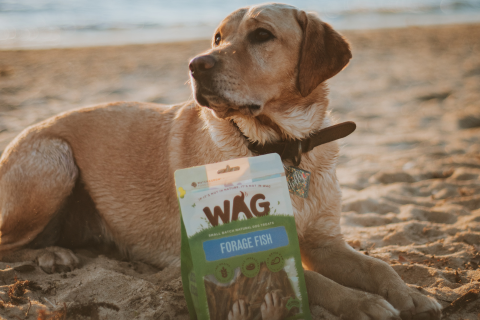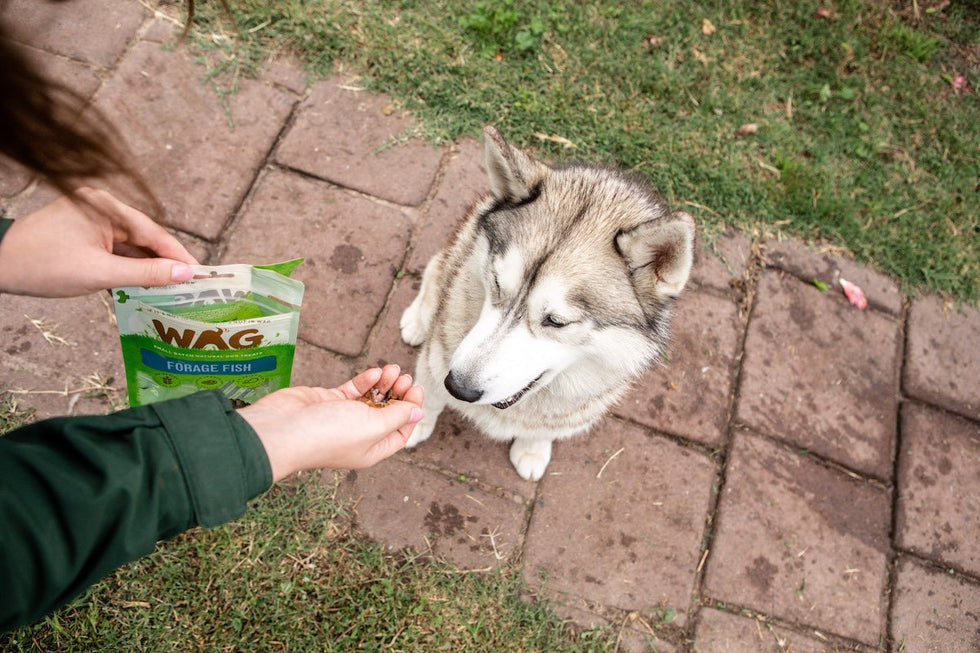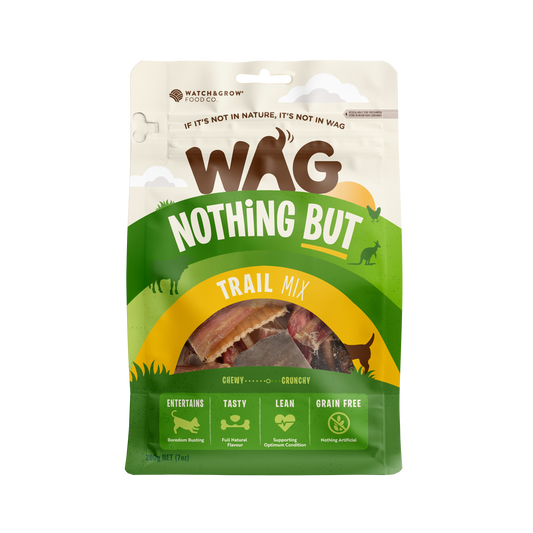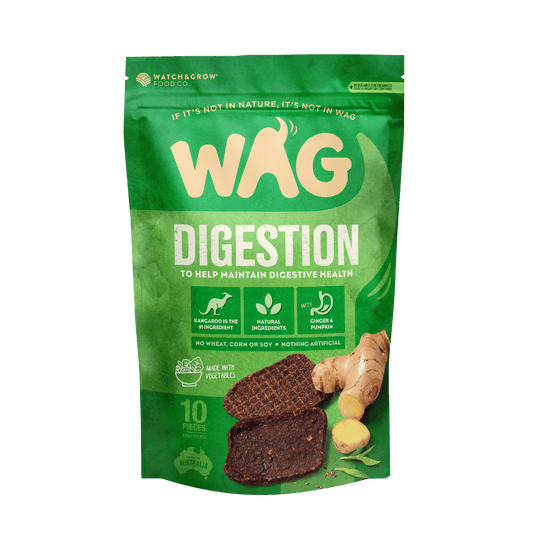What are the benefits of fish treats?

Can dogs get mercury poisoning from dog treats?
Unless you feed your dog a lot of fish, you need to worry about mercury poisoning from your dog’s food or treats. Fish – like every protein or food you feed your dog – needs to make up a balanced diet. Don’t feed your dog in excess of anything.
All WAG treats are sourced as byproducts (more about that later) from suppliers who sell fish for human consumption. This testing is done by Symbio Laboratories, Australia’s leading laboratory for food agriculture and environmental testing. These tests are made on the meat of the shark or fish, which generally has the largest levels of mercury. The skin and tail products used for dog treats have lower mercury levels. So, if the fish is tested safe from mercury for human consumption, you can rest assured it’s safe for your doggo as well.
Are fish treats good for dogs with sensitive stomachs?
When talking about fish treats, the good news just keeps on swimming. Not only are they nutritionally beneficial (and necessary) for all dogs, they’re also adept at satisfying the taste-buds of sensitive dogs.
Low fat, less dense and bursting with nutrients, fishy foods help support digestion in the more sensitive stomached pets. They are less likely to trigger food-based allergies. Fish is often one of the first suggested proteins for dogs undergoing an elimination diet.
Why is there such a strong smell for a healthy fish treat? Is this smell normal?
Whilst we might peg our nose to tear open a fresh bag of fish treats, most dogs are immediately drawn to its salty, addictive aroma. And this is no coincidence. Compared to our measly sense of smell, canine smell receptors are practically super-powered. Scientists estimate dog noses are somewhere between 10,000 to 100,000 more acute than human noses.
Why does smell matter so much? Compared to their enormous sensory range, dogs only have very few taste buds. They are mostly limited to sour, bitter, sweet and salty tastes and not much else. It’s your dog’s sense of smell that actually provides the most information on exactly what they’re chowing down on. So that salty, fishy, tangy smell that makes us scrunch our nose up, drives them dog-gone wild!

What fish treats will be best for my dog?
When selecting a treat for your dog, it's important to consider your goals and what you hope to achieve with that treat. Do you need a high value treat to aid in training, or are you looking for a long-lasting chew that promotes dental health and provides enrichment for your pup? Perhaps you simply want to treat your dog, showing your doggo how much you love having them in your life.
Your dog will be sitting pretty in no time with WAG's strong-smelling and satisfying fishy treats. Try mixing up your training routine with Forage Fish as a high value reward. Dogs that want something to chow down on will also love the soft but tough chew of a Shark Tail or Shark Cartilage. Always remember that natural dog treats are going to be the healthiest option for your pet.
Are fish treats ethical?
Being environmentally conscious means being compassionate about sea-dwelling populations just as much as those on land. Within the last 50 years overfishing has become a global concern, with companies employing unsustainable fishing habits that are pushing ocean populations of creatures to the brink of extinction.
But fishing and sustainability don’t have to be mutually exclusive. You should ensure the manufacturers of your fishy snacks are supporting sustainable fisheries. Because there are fishing processes that respect the marine environment and fish with little impact on wild fish populations.
How can be fishing be ethical?
Being environmentally conscious means being compassionate about sea-dwelling populations just as much as those on land. Within the last 50 years overfishing has become a global concern, with companies employing unsustainable fishing habits that are pushing ocean populations of creatures to the brink of extinction.
But fishing and sustainability don’t have to be mutually exclusive. You should ensure the manufacturers of your fishy snacks are supporting sustainable fisheries. Because there are fishing processes that respect the marine environment and fish with little impact on wild fish populations.
How can I find out if fish are ethically sourced?
It’s important to look at what sort of fish or shark your products are coming from. Australia’s Sustainable Seafood Guide hosts a traffic light system to rate our seafood, where it comes from, and whether it’s from a threatened species.
Staying educated and informed is key. Using the GoodFish Guide, you can find out where your fish comes from.
Their guide works as followed:
- If listed in green, these fish are a good choice – they’re not overfished
- If in amber, the methods these fish are caught with posing some environmental risk that is not considered serious
- and if in red these fish are generally overfished or threatened species that we should avoid consuming.
All fish treats we offer at WAG are listed green in the Good Fish Guide.
Using byproducts for fish treats
On its own, the term byproduct can sometimes feel like a bit of a dirty word when it comes to dog food. This is because some lower-grade commercial pet foods opt for low quality byproducts in their feed that don’t add any nutritional value to your pet.
But when it comes to 100% natural treats, this isn’t always the case. Particularly when it comes to fish treats. Byproducts in the fishing industry refers to the raw materials that are used to produce fishmeal and fish oil. In the case of dog treats, these can also refer to using the skin or tail of fish or shark.
Meeting your dog’s nutritional needs should be eco-friendly, environmentally responsible and above all sustainable. Fish and shark that are harvested for human consumption, leave byproducts such as tail and skin. When these byproducts are picked up by WAG, it means less waste and a more sustainable way to fish. If your doggo has a hankering for that salty, fish treat taste, look to fish treats that are 100% natural and sourced as by-products from human consumption as your most sustainable option.
How WAG sources their fish products
WAG feel strongly about ethical consumption, ensuring that each and every ocean treat is fished and farmed responsibly. WAG ensure the manufacturers of our fishy snacks are supporting sustainable fisheries, or are fishermen employing sustainable practices themselves.
In our bigger bites from the deep blue, like Shark Tail, our motto holds true: we never let a good thing go to waste. We piggyback off ethical companies who fish for human consumption and take away the byproducts they don’t want – but your dog definitely will. WAG shark products are ethically sourced in Queensland, and shark fins are from black tip whaler sharks (a prolific species of shark that meet the sustainable category).
So don’t flounder – dive into ocean treats, and reap the benefits. We promise you won’t look back.
Try This
WAG Team
Up Next
How to use treats when training your dog





